What is the principle behind “eye for eye”? What does “turning the other cheek really mean”? When someone offends you what are different ways you can retaliate/ What is the smartest way? Why?
The Extra Mile
Overview
Bible passages: Matt 5:38-42; Luke 6:29-30
Objectives
Theme Verse
Kinds of Retaliation In The Bible
Law of “Eye for an Eye” in the OT
Lessons Learnt
Discussion
Objectives
To:
- Understand the meaning and the kinds of retaliation in the Bible
- Draw a parallel between the law of retaliation in the OT and the NT
- Capture the essence of Jesus’s teachings from the theme verse
Key Verses
Matthew 5:38 “You have heard that it was said, ‘Eye for eye, and tooth for tooth.’ 39 But I tell you, do not resist an evil person. If anyone slaps you on the right cheek, turn to them the other cheek also. 40 And if anyone wants to sue you and take your shirt, hand over your coat as well. 41 If anyone forces you to go one mile, go with them two miles. 42 Give to the one who asks you, and do not turn away from the one who wants to borrow from you.
The Extra Mile?
These verses have been described by many in the following ways:
- The hard sayings of Jesus
- The most difficult verses in the Bible
- Hyperbole and impossible
- Commands for another world
- Greatest recorded sermon on the mount
The Extra Mile?
In Jesus’ day, a Roman soldier had the right to press any Israelite into carrying his pack for him up to one mile.
Jesus exhorts to:
- Go beyond the call of duty
- Reflect Christ’s grace to a fallen world
Turn the Other Cheek
The Greek verb here implies slapping someone in the face as an insult more than enduring physical violence [1].
The context reinterpreted conveys on most occasions:
- Silence may actually dampen the insult
- Retaliating is more likely to escalate it.
- Response should be designed to bring the other person close to Christ
Give the cloak as well
- The tunic was an inner garment. The cloak:
- The outer garment
- Often used by the poor to protect and provide warmth
- Could not be taken away by OT law (Ex 22:26-27)
In a situation where legal dispute is intended, in order to maintain peace, Jesus advises:
- Not to fight for rights
- To give away the cloak
- Look to the Lord for protection and provision (Mt. 6:28-31)
Kinds of Retaliation in the Bible
-
Bible References: Genesis 4:23-24, Exodus 21:23-25, Romans 12:19
Unlimited Retaliation
Lamech said to his wives: “Adah and Zillah, hear my voice; you wives of Lamech, listen to what I say: I have killed a man for wounding me, a young man for striking me. If Cain’s revenge is sevenfold, then Lamech’s is seventy-sevenfold.” (Genesis 4:23-24)
Lamech was clearly “over-the-top” and not of the Lord. Murder was:
- A response to injury
- Taken into his hands and hands of family members
- Enhanced by his son Tubal Cain was “a maker of every cutting instrument of bronze and iron”
Limited Retaliation
The fabled “eye for eye, tooth for tooth” Exodus 21:23-25
Instituted in the Old Testament as part of:
- The legal and judicial system of the nation Israel
- Not meant as personal retaliation but a civil code
Today we fall under the legal and civil code of our government.
Limited Retaliation
No Retaliation
Beloved, never avenge yourselves, but leave it to the wrath of God, for it is written, “Vengeance is mine, I will repay, says the Lord.” (Romans 12:19)
There is no retaliation at a personal level. The individual hands over to God to prevent sin “in anger”.
Replaced Retaliation
This (Matt 5:38-44) is not the same as no retaliation. It seeks to:
- Replace vengeance with grace
- Collaborate in mutual best interest of both parties
- Win the other party to a stronger relationship with yourself and Christ
When Jesus healed the soldier’s ear after being arrested he retaliated with grace and love.
Replaced Retaliation
When they hurled their insults at him, he did not retaliate; when he suffered, he made no threats. Instead, he entrusted himself to him who judges justly. (1 Pet. 2: 23)
Jesus said, “Father, forgive them, for they do not know what they are doing.“… (Luke 23:34)
BEING OF CHRIST MEANS GOING THE EXTRA MILE
THE EXTRA MILE - lessons learnt
What these scriptures don’t teach
It does not:
- Teach absolute passivism
- Enable, encourage a sinner to do wrong
What these scriptures do teach
There should be:
- No retaliation or replaced retaliation
- Forbearance and forgiveness
A motive to gain the other’s welfare and maintain peace
Discussion
When does this teaching pose a challenge in realistic terms? How do we address it?
Share examples of how you have practiced:
- no retaliation
- replaced retaliation.
In what kinds of situations might we have the opportunity to “go the extra mile?”
References
1.https://jeremyedgar.wordpress.com/
2.https://bible.org/
3.https://www.biblegateway.com/resources/commentaries/
4.https://www.youtube.com/watch?v=nYLr9K4sP3g
5.NIV study bible notes





